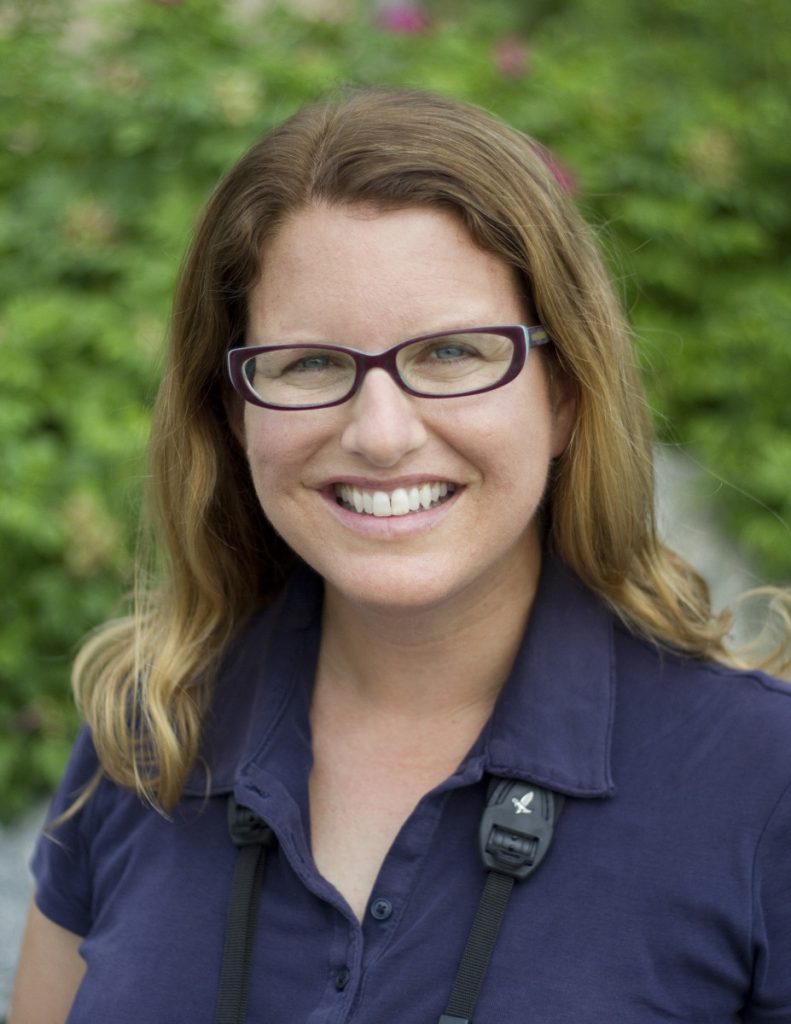Amid the bustling urban landscape of Brooklyn, New York, a variety of bird species find home in the green spaces in between the towering skyscrapers and crowded concrete streets. While subtle and hidden at times, the birds draw a large community of birders who know where to find them. Birding expert Heather Wolf will bring her knowledge of New York birds from Brooklyn to Chautauqua this afternoon.
At 12:15 p.m. Tuesday, July 19, at Smith Wilkes Hall, Wolf will discuss the migratory birds of the area and share ways to enhance an overall birding experience in her lecture “The Birds That Surround Us and How to Find Them.” Wolf will be the fourth speaker for the Bird, Tree & Garden Club’s Brown Bag series for the 2022 season.
As an application programmer for Cornell Lab of Ornithology, Wolf has developed several online birding tools, including eBird and BirdCast. She has taught numerous birding courses at Brooklyn Botanic Garden and Brooklyn Brainery, while also giving lectures for organizations like Spotify and NYC Audubon. Her photographs of birds are currently featured in the “New York at Its Core ‘’ exhibit at the Museum of the City of New York.
Wolf comes to Chautauqua for the first time from Brooklyn, where she has documented bird species interacting with city life against the urban setting of New York for her 2016 book Birding at the Bridge: In Search of Every Bird on the Brooklyn Waterfront.

“Urban birding is really good because the habitats are so small and concentrated,” Wolf said. “They’re basically micro-habitats. When the birds are there, they’re easier to find, especially during migration, because you have these little pockets, whether it’s a little marsh or a couple of lawns or a stand of trees.”
While more accustomed to birding in a metropolitan habitat, Wolf is well-versed in finding local birds in more rural areas like Chautauqua.
“It’s pretty amazing because when you travel to more rural areas, it can be more difficult to see the birds,” Wolf said. “You hear them a lot. They’re high in the trees. They’re more hidden, because there’s just more around where they can hang out.”
Wolf plans to highlight four topics in her lecture, including the migratory habits of birds local to Western New York.
“A lot of (the birds) are insectivores, and they basically come up here to take advantage of all of the insects that are up here in the spring and summer because that gives them plenty of food to feed their young,” Wolf said. “Also, there’s a lot of space for nesting. … You get all these really cool birds that are, in the winter, staying in Venezuela or Colombia or elsewhere in South America or the Caribbean, and then they’re in our backyards and our parks up here during spring and fall migration and summer.”
Another topic Wolf aims to touch on is “patch birding,” a practice in birding that involves choosing a small, isolated area of birds to regularly monitor and check up on. Wolf often does patch birding in small moments before heading to work.
“You’re basically looking for birds, or just experiencing birds in nature, in a location that’s generally very close to home, so that you can visit there several times a week,” Wolf said. “What happens when you do that is you get very familiar with the resident birds there. You also get to witness amazing bird behaviors, even with the most common birds. The benefit of patch birding is you don’t have to travel far.”
Wolf will also talk about tips for beginning birders and the program eBird, one of the largest biodiversity citizen science projects in the world, that allows beginners to data track fledgling populations, flight patterns and more.
“There’s some really cool things you can do on eBird,” Wolf said. “You can submit your sightings to it, and because people do that around the world, it’s a really good tool to discover where the birds are, and how to find birds in your neighborhood, and also anywhere in the world based on sightings that people have submitted.”
Wolf says all Chautauquans are welcome to the lecture, regardless of birding experience.
“I hope that the outcome of my lecture is that more people become interested in looking at birds,” Wolf said, “and that I make it easy for people to find birds and experience not only migration, but to experience birds in their neighborhoods throughout the year.”




